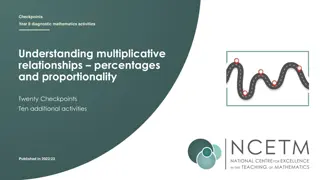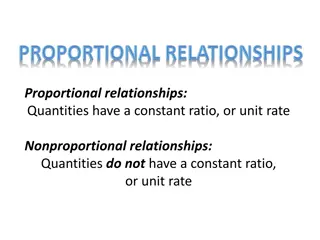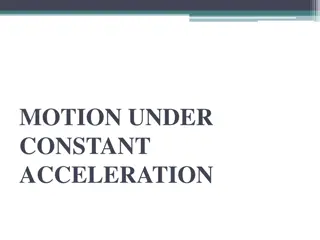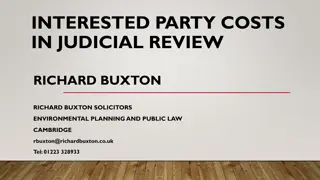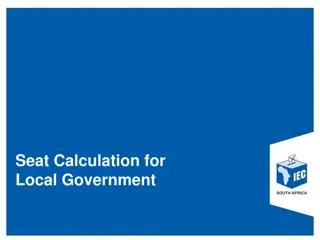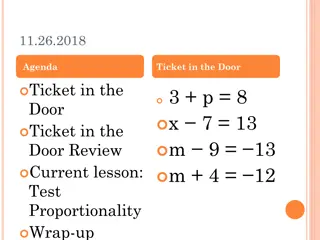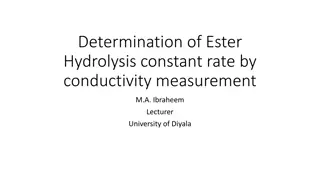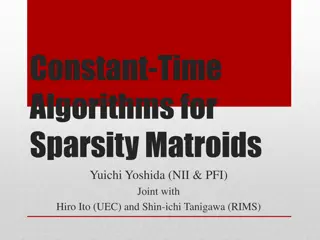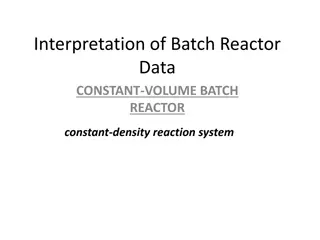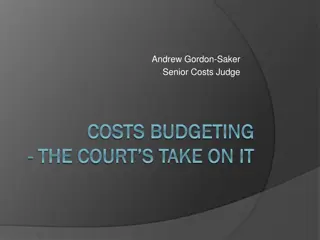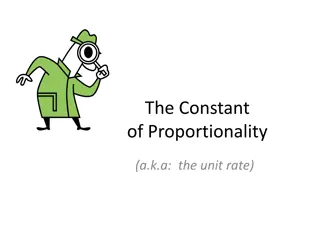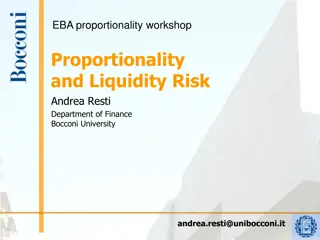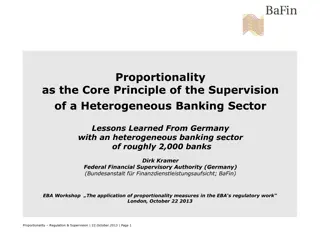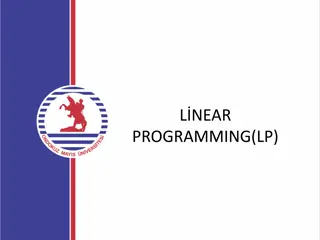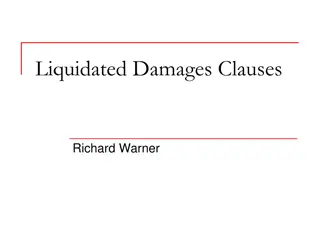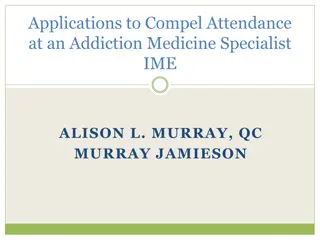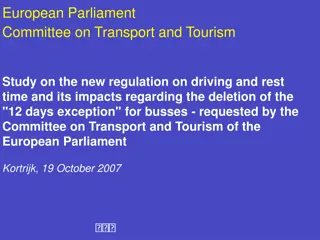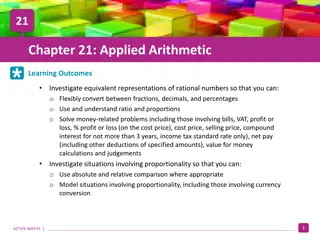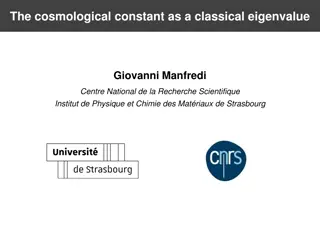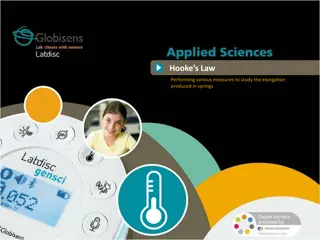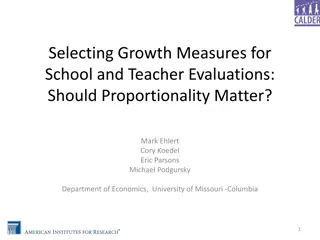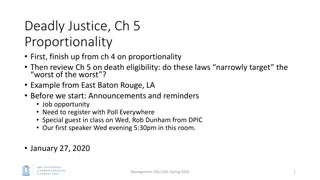Understanding Multiplicative Relationships in Percentages and Proportionality Activities
Engage with a comprehensive set of Checkpoints and additional activities focused on understanding multiplicative relationships, percentages, and proportionality in mathematics. Explore visual aids, problem-solving scenarios, and practical applications to enhance learning outcomes and skills advancem
1 views • 68 slides
JUDICIAL REVIEW OF NATIONAL ACTION BY UNCLOS COURTS AND TRIBUNALS
International judicial review involves oversight by international courts and tribunals over the actions of States Parties in implementing their international commitments. UNCLOS courts exercise supervisory jurisdiction through grounds of review like due regard, reasonableness, necessity, and proport
1 views • 7 slides
Comprehensive Training on Use of Force and Control Tactics
This comprehensive training focuses on legal concepts, civil liability, critical decision-making, de-escalation techniques, and sound control tactics in relation to the use of force and control tactics. Emphasis is placed on the sanctity of human life, proportionality (legally and ethically justifie
0 views • 42 slides
Introducing Turnkey's groundbreaking iPM instrument
\nIntroducing Turnkey's groundbreaking iPM instrument! Revolutionizing air quality analysis, it combines light extinction & scatter for precise airborne particle measurement. Now, track all PM size fractions simultaneously with unmatched accuracy. \nKEY FEATURES:\n1. Measures PM10, PM4 (respirable),
1 views • 2 slides
Robin Klein's Poetic Reflection on Childhood Innocence
Robin Klein's poem portrays the constant nagging of a little girl named Amanda by her mother for various perceived flaws. Amanda imagines herself as a mermaid, an orphan, and Rapunzel in response to the criticisms. The poem highlights the desire for freedom from continuous scrutiny and the impact of
1 views • 17 slides
Understanding Proportional and Nonproportional Relationships in Mathematics
Proportional relationships involve quantities having a constant ratio or unit rate, while nonproportional relationships lack this constant ratio. By examining examples such as earnings from babysitting and costs of movie rentals, we can grasp the differences between these two types of relationships.
2 views • 6 slides
Understanding Motion Under Constant Acceleration
Constant acceleration refers to motion where the speed increases by the same amount each second. It is exemplified in scenarios like free fall due to gravity, where objects experience a consistent acceleration of approximately 10 meters per second squared. This type of motion plays a significant rol
0 views • 11 slides
Legal Education and Judicial Ethics Seminar - Transforming Legal Cultures
Enhance your understanding of the CPR overriding objective and its interpretative mandates in the legal context. Explore concepts of substantive and procedural justice, principles of proportionality, and the judicial oath of office. Delve into the Supreme Law of the Bahamas, right to protection of t
0 views • 54 slides
Challenges and Opportunities in Judicial Review Costs
CPRE Kent appealed for a fairer costs order in a local plan challenge, seeking better access to justice. Key cases like Mount Cook and Luton highlight the complexities in costs allocation. The appeal to the Supreme Court aims to address these challenges and seeks clarity on the proportionality appro
0 views • 7 slides
Local Government Seat Calculation Framework
The legislative framework in South Africa outlines the seat calculation process for local government elections, emphasizing proportional representation. It involves determining quotas for proportionality, allocating seats based on total party votes, and addressing scenarios where parties may have mo
0 views • 8 slides
Understanding Gas Laws: Boyle's, Charles', Gay-Lussac's, and Avogadro's Laws
Gas laws such as Boyle's Law, Charles' Law, Gay-Lussac's Law, and Avogadro's Law govern the behavior of gases under different conditions. Boyle's Law relates pressure and volume at constant temperature, Charles' Law relates volume and temperature at constant pressure, Gay-Lussac's Law relates pressu
1 views • 19 slides
Understanding Proportional Relationships in Mathematics
Explore the concept of proportionality using graphs, tables, and ratios. Learn how to determine if a relationship is proportional by analyzing ratios y:x and the constant of proportionality. Practice exercises and examples provided for better comprehension.
0 views • 22 slides
Determination of Ester Hydrolysis Constant Rate by Conductivity Measurement
This study focuses on determining the ester hydrolysis constant rate through conductivity measurement, presenting a second-order reaction example. Conductivity meter is utilized for accurate monitoring. The procedure involves utilizing equal concentrations of ester and sodium hydroxide, measuring co
0 views • 6 slides
Understanding Section 42 Enquiries in Regulated Care Settings
Demystify Section 42 enquiries in regulated care settings with insights, tips, and learning themes. Learn about the safeguarding service, good enquiry practices, incorporating personal safeguarding, recent enquiry themes, tools, and more. Discover how the service works, who can undertake enquiries,
0 views • 20 slides
Understanding Direct Variation in Math
Explore the concept of direct variation in math through an analysis of proportional relationships, constants of proportionality, and graph representation. Practice identifying direct variation and determining the constant of proportionality to interpret the data effectively.
0 views • 20 slides
Advanced Fission Experiments at University of Michigan
The University of Michigan, under the guidance of Dr. Sara A. Pozzi, conducts cutting-edge fission experiments leveraging organic scintillation detectors. These detectors offer advantages such as nanosecond-scale response times, energy proportionality, and scalability. The experiments focus on impro
0 views • 4 slides
Constant-Time Algorithms for Sparsity Matroids
This paper discusses constant-time algorithms for sparsity matroids, focusing on (k, l)-sparse and (k, l)-full matroids in graphic representations. It explores properties, testing methods, and graph models like the bounded-degree model. The objective is to efficiently determine if a graph satisfies
0 views • 21 slides
Interpretation of Batch Reactor Data for Constant-Volume Systems
This content delves into the analysis and interpretation of data from constant-volume batch reactors in constant-density reaction systems. It covers integral methods for analyzing data, considerations for irreversible reactions, and the behavior of zero-order and first-order reactions. The text also
0 views • 12 slides
The Courts' Perspective on Costs Budgeting in Litigation
The senior costs judge expresses concerns about judiciary involvement in managing parties' budgets, highlighting potential inefficiencies and drawbacks. Emphasizing the importance of skilled professionals working efficiently, the article underscores the need for more costs education for judges to ac
1 views • 11 slides
Understanding Use of Force and Control Tactics Training
Explore the legal aspects, civil liability, decision-making practices, de-escalation techniques, and control tactics related to use of force. Emphasizes the sanctity of human life, proportionality in force application, and justifications under the U.S. Constitution and statutes. Examines the criteri
0 views • 42 slides
Understanding the Constant of Proportionality in Real-Life Scenarios
Explore examples involving the constant of proportionality, also known as the unit rate, to understand how relationships between quantities can be represented. In these scenarios, calculations revolve around baking cookies for a school's Bake Sale and spending money on bowling games, showcasing how
0 views • 5 slides
Challenges in Constant-Round Public-Coin Zero-Knowledge Proofs
The paper discusses the implausibility of constant-round public-coin zero-knowledge proofs, exploring the limitations and complexities in achieving them. It delves into the fundamental problem of whether such proofs exist, the challenges in soundness error reduction, and the difficulties in parallel
0 views • 20 slides
Proportionality Principle in Liquidity Risk Management
The concept of proportionality is essential in evaluating measures related to liquidity risk management in the banking sector. The principle emphasizes the necessity for measures to be appropriate, necessary, and not disproportionally disadvantageous. By applying a 3-stage test, institutions can ens
1 views • 10 slides
Overview of EU Criminal Law Changes After Lisbon Treaty
The Lisbon Treaty signed in 2007 brought significant changes to EU criminal law, moving cooperation from the EU Treaty to the Treaty on the Functioning of the EU. It abolished the pillar structure, expanded the CJEU's competences in criminal law, and emphasized the area of freedom, security, and jus
0 views • 28 slides
European Social Policies and EU Limits: A Comprehensive Overview
EU social policies are guided by the principle of subsidiarity, ensuring decisions are made close to the citizens. The EU's role is to set framework conditions and compensatory programs, while social policy largely remains the responsibility of individual member states. The Union can act in a policy
0 views • 16 slides
Proportionality as Core Principle in Supervising Heterogeneous Banking Sectors: Lessons from Germany
The supervision of a diverse banking sector, such as Germany's with roughly 2,000 banks, is based on the core principle of proportionality. This approach involves tailoring regulations and oversight to fit the individual characteristics of each institution, focusing on qualitative aspects, organizat
0 views • 8 slides
Linear Programming in Quantitative Problem-solving
Linear Programming (LP) is a powerful tool for solving quantitative problems, providing solutions for a wide range of scenarios such as farm planning, stock control, and financial planning. This method involves defining objectives, alternatives, and resources to maximize income or minimize costs eff
0 views • 63 slides
Understanding Liquidated Damages Clauses in Contracts
Liquidated damages clauses serve to determine a precise amount of damages in case of contract breach when actual damages are difficult to ascertain. Courts enforce such clauses if they meet certain criteria based on reasonability and proportionality. Historical hostility towards these clauses has le
0 views • 17 slides
The Capital Punishment Process: Aggravators, Mitigators, and Post-Conviction Appeals
The continuation of the discussion on the capital punishment process, specifically focusing on the bifurcated trial, the consideration of aggravators and mitigators, post-conviction appeals including direct appeal and Habeas Corpus appeals, and the importance of proportionality review in state supre
0 views • 25 slides
Compelling Attendance at Addiction Medicine Specialist IME
Court orders for examination by medical practitioners in cases where physical or mental conditions are in question. Examples of cases where plaintiffs were ordered to provide blood and urine samples due to alleged addiction issues. Instances where addiction issues were discovered through evidence an
0 views • 13 slides
Canada's Income Security System and Basic Income Overview
Exploring Canada's income security system, this presentation delves into the current programs, proportionality in distribution, poverty statistics, and the concept of basic income. It highlights the estimated income transfers across different target groups and programs, emphasizing the need for addi
0 views • 26 slides
European Parliament Committee Study on Regulation Impact Regarding Deletion of "12 Days Exception" for Busses
European Parliament Committee on Transport and Tourism conducted a study on the new regulation pertaining to driving and rest time for busses, specifically focusing on the removal of the "12 days exception." The study aimed to assess the economic impact, industry competitiveness, road safety, and ef
0 views • 8 slides
Practical Concepts in Applied Arithmetic
Explore equivalent representations of rational numbers, convert between fractions, decimals, and percentages, understand ratios and proportions, solve money-related problems, and delve into situations involving proportionality. Learn about wages, salaries, gross pay, net pay, statutory deductions, i
0 views • 15 slides
Exploring the Cosmological Constant as a Classical Eigenvalue
The concept of the cosmological constant, its implications in the standard cosmological model, and its relation to dark energy are discussed in this scientific exploration. The discussion delves into whether the cosmological constant is truly constant or varies in space and time, and its role in gra
0 views • 10 slides
Exploring Hookes Law in Spring Elongation Studies
Investigate the variations in spring length and associated physical magnitudes using Hookes Law. Understand elasticity properties through experiments with springs while exploring the direct proportionality between force and elongation. Students form hypotheses and test them using force sensors in th
0 views • 20 slides
The Evolution of Decision-Making and Sovereignty in the EU Integration
The shift from political to judicial decision-making in the pursuit of EU economic integration has raised questions about sovereignty within the EU framework. Key topics include the division of competences outlined in the treaties, the rise of the judicial sovereign, expansion of EU sovereign throug
0 views • 7 slides
Understanding Solubility Product Constant for Slightly Soluble Salts
Solubility product constant (Ksp) is a special constant that describes the solubility of slightly soluble salts like potassium acid tartrate (KHT) and silver chloride (AgCl) in solution. This experiment aims to determine Ksp for KHT and explore factors affecting Ksp such as temperature and common io
0 views • 13 slides
Water-Energy Nexus Cost Allocation Workshop Insights
Workshop discussion focuses on proportional cost allocation among energy IOUs and water agencies based on benefits realized. Emphasis on avoiding cross-subsidies and considering strict proportionality where benefits match or exceed costs. Debate on relaxing proportionality for energy ratepayer subsi
0 views • 16 slides
Proportionality and Growth Measures in School and Teacher Evaluations
Growth models in educational evaluations are a topic of intense debate, with discussions around the selection of appropriate models to achieve optimal effort from agents, provide useful performance signals, and avoid exacerbating inequities. The proportional VAM model is proposed as a suitable choic
0 views • 20 slides
Understanding Death Eligibility Laws and Proportionality in Criminal Justice
Exploring the concept of proportionality in death eligibility laws, focusing on the narrow targeting of offenders and the assessment of cases for the death penalty. Examples and discussions from legal cases and studies are presented to evaluate the effectiveness and fairness of these laws.
0 views • 28 slides
